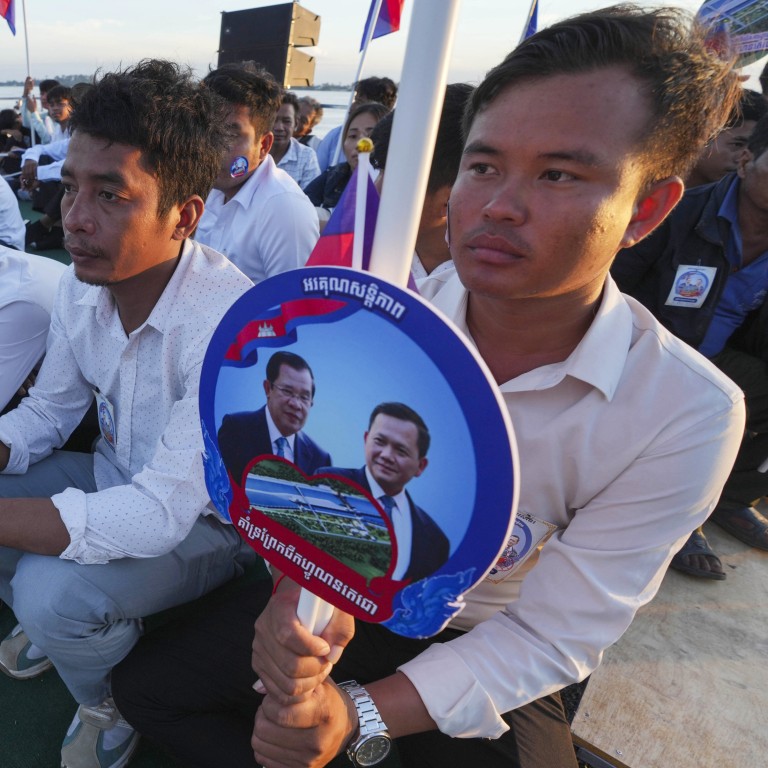
Japan-based Cambodian activist demands Hun Sen and PM son release his brother
- Activist Vanna Hay has criticised a border development project and says his brother Vannith’s detention is an act of ‘revenge’
Vannith Hay, 28, brother of activist Vanna Hay, was detained on August 16 as he attempted to cross the Cambodian border into Thailand, the latter told This Week in Asia. Vannith was trying to flee his homeland just days after Vanna managed to get seven members of his immediate family to Japan, where he has lived since 2008.
In July, in his current capacity as the president of the Cambodian Senate, Hun Sen called on the government to identify locally- and overseas-based individuals and groups opposed to the CLV and their family members, said Vanna, the leader of the Cambodia National Rescue Movement in Japan.
Consequently, around 60 people were detained in a crackdown between August 14 and August 19. Vannith, who works for the health ministry, has never publicly expressed any position on the CLV and is not a member of any protest group, according to his brother.
“My brother has nothing to do with my political advocacy,” Vanna insisted. “He is a public servant with the National Institute of Public Health and a researcher who has been working hard to improve the health of the ordinary people of Cambodia.”

Vanna added that his family were “very frightened” when “Hun Sen warned people at home and the diaspora abroad” not to continue their protests against the CLV and news of the crackdown began to spread in Cambodia.
While the rest of the Hay family chose to leave the country, Vannith believed he would be safe because he worked for the health ministry and had never been involved in political protests. When he realised that he was in danger as well and tried to leave for Thailand, it was too late, his brother said.
“We have been trying to contact him but we have very little information,” said Vanna, who vowed to continue his resistance against Phnom Penh.
“I am not afraid of Hun Sen and I will continue to report everything that the regime there is doing to hold them accountable,” he said. “They have tried to pressure us and silence us, but it is clear that the only thing they can do against me is to take my brother and hold him hostage.
“I am sure they would have taken my entire family hostage if they had been able to but I was fortunate enough to help them to leave and to come to Japan,” he added.
Vanna also said the protests that he and other activists held in Japan have had a big impact on Cambodians as they showed they were no longer afraid of the dictatorship.
“The detention of my brother is an abuse of his human rights and a breach of Cambodia’s constitution,” he added. Vanna has called on foreign governments to condemn arbitrary detentions in Cambodia and appealed to the US and Japanese governments to intervene.

“If Hun Sen wants to punish me, I can understand that but my brother has done nothing wrong and he has been seized as a hostage. He should deal with me, not my brother.”
Human Rights Watch has called on the Japanese government to respond to Vanna’s claim about his brother’s situation.
“The government has made no public mention of this case so far and has not, as far as we can tell, pushed back against the Cambodian government’s actions,” said Teppei Kasai, a programme officer at the Japan office of HRW.
Kasai said Tokyo should raise the case and that of other protesters who have been detained for expressing their basic rights of freedom of expression and assembly and demand that they be released.
“This is a very common tactic employed by authoritarian regimes,” he said. “Vanna Hay is in Japan and they cannot touch him here, so they have targeted his younger brother after the present and former prime ministers made public threats against Vanna. This is all an attempt to put pressure on him and to force him to stop his activities in Japan.”
The authorities in Phnom Penh have used similar approaches in the past, according to Kasai. In May, Sun Chanthy, the head of the opposition National Power Party, was arrested immediately after arriving in Cambodia from Japan, where he had given a speech to supporters demanding that the Cambodian government permit opposition parties to operate freely.

In July, a Cambodian court found Teav Vannol, head of the opposition Candlelight Party, guilty of defamation and fined him US$1.5 million after he criticised Hun Manet and Hun Sen in a media interview in Tokyo.
Kasai said that as a major donor of aid to Cambodia and a key partner in the Southeast Asian country’s 1993 democratisation campaign, Japan has influence that could be applied to Phnom Penh. “Tokyo should be in the forefront in telling Cambodia that any form of transnational repression is completely unacceptable,” he said.
Vanna said he has no intention of halting his efforts to bring about peaceful political and societal change in his homeland.
“I am calling on Japan to halt all official development assistance to the Cambodian government,” he said. “I do not want to hurt the Cambodian people but they have to understand that Japanese ODA is helping the regime to stay in power for longer. I am calling for free and fair elections.”
This Week in Asia has contacted the embassy of Cambodia in Japan and the foreign ministry in Phnom Penh for comment.

